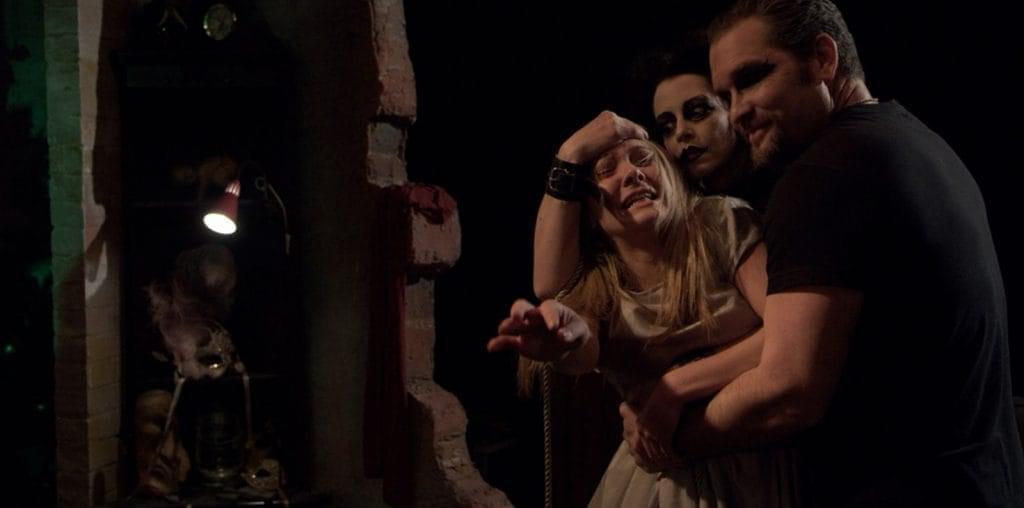
It’s the 1930s, and John Patton, Jr. (Bennett Parker) is part of an archaeological dig involving a number of burial mounds in Moundville, Alabama, revealing some curious, not-quite-man, not-quite-animal remains that raise questions about the origins of humanity. Cut to many decades later, and Gardner Patton (Elliot Moon), John’s grandson, and Gardner’s girlfriend Kelsey (Elise Zieman) are in a university class, preparing to investigate the same mounds that John explored. The aftermath of John’s legacy, however, has not been a positive one, as his tales of what was found in the mounds eventually left him in disrepute in scientific circles, especially when he wrote a bestselling book about it all. Not wanting to follow into his grandfather’s footsteps, and be academically ostracized, Gardner tries to hide from his legacy.
Of course, things aren’t that easy, especially when Gardner’s cousin Bart (Luke Weaver) returns to town with a documentary crew, looking to film the upcoming expedition to the mounds for reasons all his own; reasons that he’s not very forthcoming about. Did John really find something inhuman all those years ago, or was it a hoax? What will Gardner and Bart discover? While Gardner remains skeptical about the mounds, Bart seems to be coming at it from a different angle, stoking Gardner’s curiosity until the dig itself provides an entirely new narrative for the family members to deal with.
A Genesis Found is a quality mystery on the surface that winds up being about so much more as the film rolls along. Philosophically nuanced, the film does stumble a bit with an almost glacial pace, sometimes getting too ponderous for its own good. Still, it tells a solid story with ambiguity in all the right places, and is an entertaining experience for those willing to put in that little extra effort and patience.
The acting is passable-to-good for most everyone involved, and if you close your eyes, or at least turn away whenever Luke Weaver steps onscreen and starts acting, you could easily be tricked into thinking that Matthew McConaughey is in the film. I can’t tell you if that was an overly-affected accent Weaver was putting on, or whether he actually sounds like that, but he’s definitely channeling some intense McConaughey-ty, sans the need to take his shirt off. It can make listening to him a chore at times, because he does have a significant bulk of dialogue, but it also becomes endearing the longer you hear it.
The mystery of what it is that John Patton, Jr. found in the 1930s, and whether it’s all real or a hoax, eventually falls by the wayside as the true intriguing aspect of the tale. There’s a philosophical shift that takes place, where one must question their own reasons or needs for it all to be real, or at least to believe in something, which becomes more powerful a conversation than the answers could ever actually provide. At that point, the audience needs to decide whether they’re ready to jump on this new track, or whether they just want to see some aliens or monster or something. If you’re of the latter camp, I can see how this film’s slow pace could become even more laborious, though if you get into it on the philosophical level, things become far more nuanced and interesting.
Overall, A Genesis Found is not going to be for everyone. I think it does a solid job telling the complex tale it sets up for itself (weaving in multiple timelines while trying to keep the mystery fresh the entire time), but I can also see that the film drags in spots, and the pacing, even for someone like myself who was into it for the most part, can become an endurance trial. Still, when I set the “real or hoax” questions aside and pondered my own reasons for wanting to have an answer in the first place, I appreciated the film on an entirely different, far more satisfying, level.
This film was submitted for review through our Submission for Review system. If you have a film you’d like us to see, and we aren’t already looking into it on our own, you too can utilize this service.

